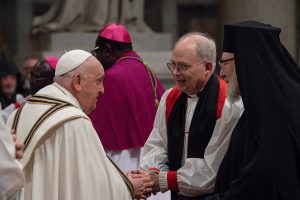(OSV News) – Dialogue, listening and the power of prayer are key to forging Christian unity, Catholic experts told OSV News.
Christians throughout the world will mark the annual Week of Prayer for Christian Unity Jan. 18-25, with the theme for 2025 taken from John 11:17-27 — specifically Jesus, having declared he is the resurrection and the life, asking Martha, “Do you believe this?” (Jn 11:26).
The annual observance, formally instituted in 1968 by the Vatican and the World Council of Churches, traces its roots to the 18th century, with Pentecostal, Anglican and Catholic clergy all promoting prayers over the intervening decades to restore bonds among believers.

Among Catholics, Pope Leo XIII; Father Paul Wattson, who founded the Franciscan Friars of the Atonement; Dominican Father Yves Congar, a theologian; and Pope John XXIII were prominent advocates of ecumenism.?? The word is derived from the Greek word “oikoumene,” or “the whole inhabited world.”
In its Decree on Ecumenism (“Unitatis Redintegratio”), the Second Vatican Council declared “the restoration of unity among all Christians” was “one of (its) principal concerns.”
The council itself “really propelled us into this arena in a very, very important way,” while building on “the prayer of Jesus … offered at the Last Supper” for oneness among his believers (Jn 17:20-23), said Bishop Joseph C. Bambera of Scranton, Pennsylvania, chairman of the U.S. Conference of Catholic Bishops’ Committee on Ecumenical and Interreligious Affairs.
And just as Vatican II sought in many respects to rediscover the fundamentals of Christianity – what Father Congar called a “re-centering upon Christ in his Paschal Mystery” – the 1,700th anniversary of the Council of Nicaea, celebrated this year, provides an added impetus to the work of Christian unity, Bishop Bambera said.
The commemoration of the ecumenical council – the first of the Christian church, held in 325 in what is now Turkey – offers a chance “to simply go back to our roots, to a moment when we truly walked together,” he told OSV News.
At the same time, Bishop Bambera stressed that “one of the principles we ought never forget with the work of ecumenism … is that authentic ecumenical work never, ever diminishes the reality of who we are and what we believe to develop some false or trivial sense of unity with one another.
“That serves us no purpose,” said Bishop Bambera.
Part of ecumenism “is not to be afraid to say, ‘This is what I believe as a Catholic,'” said Msgr. Gregory Fairbanks, an ecumenical expert and dean of the diaconal formation school at St. Charles Borromeo Seminary in Ambler, Pennsylvania, part of the Archdiocese of Philadelphia.
Yet having done so, the next step is “to listen to what other Christians say and what they believe, and to not be threatened by it, but to enter into a respectful dialogue about it,” Msgr. Fairbanks said.
That process is known as “receptive ecumenism,” explained Bishop Bambera.
“It means I need to listen to what you have to share with me,” he said. “I need to be open to the good things that I can bring from your experience, rather than coming from the perspective that I need you to come to me.”
Along with becoming “a very important dimension” of current ecumenical work, that approach “reflects very, very clearly the notion of synodality that the Holy Father has been promoting,” said Bishop Bambera.
In fact, “with regard to the recent synod the Holy Father concluded, the work of Christian unity could not be more significant,” Bishop Bambera said. “At the heart of synodality, we have an invitation to dialogue, an invitation to listen with care — to respect the perspectives of one another, both within our own church, and certainly in our relationships with other Christian communities.”
Both Bishop Bambera and Msgr. Fairbanks said that even amid real theological differences among Christians – whose global denominations now total some 47,000, according to the Center for the Global Study of Christianity at Gordon-Conwell Theological Seminary – there are grounds for hope.
“From a perspective of theological ecumenism, we have miles to go,” said Bishop Bambera. “From the perspective of an ecumenism of life and love, we are further along than I think we might imagine.”
Currently, “it’s not like 50 or 100 years ago, where people didn’t even think other (Christians) were really valid Christians,” said Msgr. Fairbanks. “I think we’re past that. There is a sense the differences are there; they are real. They need to be overcome. … But we share our faith in Jesus Christ. We share the same Scriptures. We share the same belief in salvation.”
Moreover, said Msgr. Fairbanks, “The Nicene-Constantinople Creed is the creed that virtually every Christian can profess.”
Both he and Bishop Bambera urged the faithful not to underestimate the power of prayer in bringing about Christian unity.
“Believe and trust that in the Lord’s time and in the Lord’s will and way, we will walk together again,” said Bishop Bambera.
